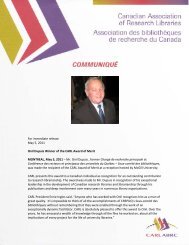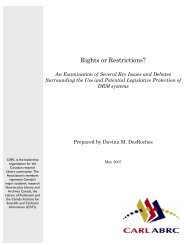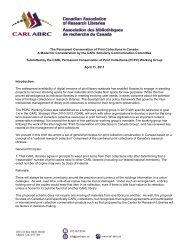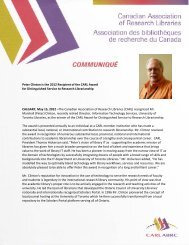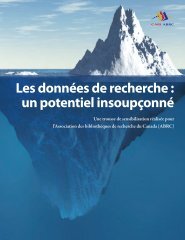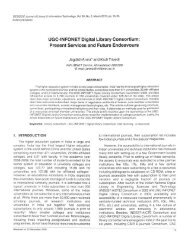PDF - CARL - ABRC
PDF - CARL - ABRC
PDF - CARL - ABRC
Create successful ePaper yourself
Turn your PDF publications into a flip-book with our unique Google optimized e-Paper software.
Special Collections in ARL Libraries<br />
March 2009<br />
8. Special collections description is increasingly open to interaction with the community of users. Archivists<br />
and librarians should encourage and take advantage of these interactions in order to promote access. Such<br />
interactions include mounting and using catalogs within social networking environments, and using and<br />
developing tools that allow researchers to contribute to the documented knowledge about a collection.<br />
9. Special exhibitions are important tools for promoting access, and should be accompanied by online digital<br />
versions, to be maintained after the physical exhibit is over.<br />
10. Large-scale digitization is an important option in the tool kit of special collections departments. Repositories<br />
should work with large-scale digitization vendors and partners to help negotiate and develop appropriate<br />
agreements for digitizing special collections. These arrangements should be broadly shared with the community<br />
as they occur.<br />
11. Repositories must also ensure that commercial partners respect and maintain basic rights over digital content.<br />
12. The Working Group recommends that ARL encourage and contribute to the RBMS development of a set of<br />
guidelines on issues relating to the mass digitization of special collections similar to the negotiation checklist<br />
developed for mass digitization of general collections.<br />
III. The Challenge of Born-Digital Collections<br />
13. New definitions need to be created for determining the scope of digital special collections, so that stakeholders<br />
can understand the nature of special collections professionals’ responsibilities. These include a responsibility for<br />
harvesting and preserving endangered web sites, wikis and other dynamic information resources.<br />
14. There is also a pressing need for training programs that will help administrators as well as special collections<br />
professionals to understand their responsibilities in this environment. Digital awareness is a responsibility that<br />
library managements need to address most especially in dealing with special collections.<br />
15. Digitization makes visible materials that may be “public” but not broadly shared, such as legal records, which<br />
remain “practically obscure” in paper form thus providing some measure of privacy protection. With digitization,<br />
the access/privacy balance is shifted and can result in unintended consequences that may raise liability concerns<br />
for the institution. Institutions may end up facing requests to redact or take down content that has been put<br />
online. There is a need for those in charge of special collections to understand and have ready access to a clear<br />
institutional policy and procedure for responding to such requests, which ensures actions are taken in light of the<br />
most current legal decision in this field.<br />
16. The imperative to collaborate becomes far more apparent in the digital environment. Special collections<br />
librarians and archivists should both welcome and seek out collaborations, with museums and galleries, with<br />
scholars creating electronic databases, with lawyers, with information technologists, and with the creators and<br />
Page 34 www.arl.org/bm~doc/scwg-report.pdf



